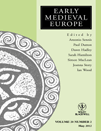
Early Medieval Europe
Scope & Guideline
Delving into the Heart of Early Medieval Studies
Introduction
Aims and Scopes
- Cultural Exchange and Interaction:
The journal emphasizes the significant cultural exchanges that occurred during the early medieval period, including the interactions between different ethnic groups, religions, and regions, particularly in the context of the Carolingian and Merovingian empires. - Manuscript Studies and Textual Analysis:
There is a consistent focus on the study of early medieval manuscripts, including their production, transmission, and the cultural contexts in which they were created. This includes analysis of legal texts, hagiographies, and liturgical materials. - Socio-Political Structures:
The journal investigates the development of political and social structures in early medieval societies, exploring topics such as governance, legal systems, and the role of the church in shaping societal norms. - Religious Practices and Beliefs:
A core area of interest is the study of religious practices, beliefs, and institutions during the early medieval period, including the role of monasticism, the spread of Christianity, and the interplay between different religious traditions. - Archaeological Perspectives:
The journal incorporates archaeological findings to provide insights into material culture, settlement patterns, and everyday life in early medieval Europe, highlighting the importance of physical evidence in historical research.
Trending and Emerging
- Gender and Queer Studies:
Recent publications increasingly explore gender dynamics and queer identities in early medieval contexts, highlighting the importance of these perspectives in understanding social structures and cultural narratives of the time. - Environmental and Economic Histories:
There is a growing interest in the environmental context of early medieval societies, particularly how economies were shaped by agricultural practices, trade networks, and ecological conditions. - Mobility and Migration:
Research focusing on mobility, migration, and the resulting cultural interactions is gaining traction, particularly in relation to the movement of peoples and ideas across Europe during the early medieval period. - Interdisciplinary Approaches:
The trend towards interdisciplinary research is evident, with scholars drawing on methods from archaeology, anthropology, and literary studies to enrich discussions of early medieval Europe. - Digital Humanities and Textual Analysis:
The incorporation of digital tools and methodologies for textual analysis and manuscript studies is increasingly prevalent, enabling new ways to engage with historical texts and artifacts.
Declining or Waning
- Traditional Military History:
Research focused solely on military history and battles of the early medieval period appears to be waning, with fewer publications concentrating exclusively on warfare without contextualizing it within broader social or cultural frameworks. - Monastic Exclusivity:
The exploration of monastic life as an isolated phenomenon is seeing less prominence, as more studies now integrate the roles of laypeople and secular influences on monastic practices and vice versa. - Static Ethnic Identity Studies:
Earlier research that treated ethnic identities as fixed and unchanging is declining in favor of more dynamic approaches that consider the fluidity of identity in the context of migration and cultural exchange. - Regional History Isolations:
There is a noticeable decline in articles focusing exclusively on isolated regional histories without connecting them to broader European or Mediterranean contexts, signaling a shift towards more integrative historical narratives.
Similar Journals

Journal of the Australian Early Medieval Association
Fostering Scholarly Dialogue on a Vibrant Historical TapestryThe Journal of the Australian Early Medieval Association is a pivotal scholarly outlet dedicated to the exploration and dissemination of research on early medieval studies, with a particular focus on Australian perspectives and contributions. Established in 2005 and published by the Australian Early Medieval Association Inc, this journal has become a cornerstone for academics, practitioners, and students interested in the intricate tapestry of history from this vibrant period. With an ISSN of 1449-9320 and an E-ISSN of 2207-2802, it provides an accessible platform for high-quality research, despite being categorized as Q4 in History, reflecting its niche positioning within the academic landscape. Though it currently does not offer Open Access options, the journal encourages contributions that delve into both regional and global early medieval contexts. As it continues its journey through the years, from 2005 to 2023, it remains committed to enriching its field and fostering scholarly dialogue on emerging themes and issues relevant to early medieval studies.
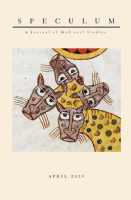
SPECULUM-A JOURNAL OF MEDIEVAL STUDIES
Charting New Paths in Historical UnderstandingSPECULUM: A Journal of Medieval Studies, published by University of Chicago Press, stands as a premier academic platform within the field of medieval studies. With an impressive legacy dating back to its inception in 1926, this journal has attracted scholarly contributions that explore the rich tapestry of human experience during the medieval period, encompassing areas such as history, literature, philosophy, cultural studies, and the visual and performing arts. It boasts elite rankings—Q1 in History, Literature and Literary Theory, Religious Studies, and Visual Arts and Performing Arts, with a commendable Q2 in Cultural Studies and Philosophy—attesting to its impact and relevance in academia. Although it is not an open-access journal, the rigorous peer-review process and critical scholarship found within its pages provide invaluable insights for researchers, professionals, and students alike. With a substantial Scopus ranking, ID 0038-7134, and E-ISSN 2040-8072, SPECULUM continues to serve as an essential resource for advancing knowledge and understanding of the medieval world, encouraging interdisciplinary dialogue and scholarly interaction.

STUDI MEDIEVALI
Illuminating the Complexities of the Middle AgesSTUDI MEDIEVALI, published by the Centro Ital Stud Sull Alto Med, is a premier journal dedicated to the exploration of medieval studies, focusing on both cultural and historical dimensions. Since its inception in 2002, this journal has become an essential resource for scholars and students alike, providing critical insights into the complexities of the medieval era. Although it currently operates under a traditional access model, its contributions to the field are undeniable, with a 2023 ranking in the fourth quartile for Cultural Studies and History categories in Scopus rankings, highlighting its niche yet valuable position within academic discourse. Based in Spoleto, Italy, the journal serves as a platform for innovative research and interdisciplinary dialogue, inviting contributions that challenge conventional understandings and stimulate further inquiry into medieval life. Researchers and professionals will find in STUDI MEDIEVALI an opportunity to engage with a community of passionate scholars dedicated to uncovering the multifaceted realities of the medieval period.
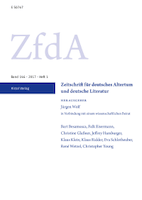
ZEITSCHRIFT FUR DEUTSCHES ALTERTUM UND DEUTSCHE LITERATUR
Celebrating the Legacy of German Language and LiteratureZeitschrift für deutsches Altertum und deutsche Literatur is a pivotal academic journal dedicated to the exploration and analysis of German-language antiquity and literature. Published by S Hirzel Verlag, this esteemed journal is based in Germany and has been contributing to the fields of Linguistics, Language, and Literary Theory since its inception. With a history spanning from 1979 to the present, the journal showcases rigorous research and critical studies that enhance our understanding of both historical and contemporary literary landscapes. Although currently not an open-access publication, Zeitschrift für deutsches Altertum und deutsche Literatur operates within the Q4 quartile in its respective categories, reflecting a unique niche within the academic community. As a valuable resource for researchers, professionals, and students alike, it fosters a deeper appreciation for the intricacies of German literature and its evolution, serving as an essential platform for scholarly discourse.

Medievalismo
Exploring the Depths of Medieval CultureMedievalismo is a distinguished academic journal dedicated to the interdisciplinary study of medieval culture, history, and societal influences, published by the esteemed University of Murcia in Spain. Since achieving Open Access in 2010, it has fostered a rich environment for the dissemination of knowledge, encouraging contributions from researchers and scholars across diverse fields. The journal holds a notable Q1 ranking in History and exhibits strong performance metrics in Arts and Humanities and Cultural Studies, as evidenced by its relevant Scopus rankings. With a commitment to promoting high-quality research and discussion, Medievalismo has positioned itself as an essential resource for academics and students aiming to deepen their understanding of the medieval period. Situated in a vibrant scholarly landscape, it continues to publish transformative insights and foster critical dialogue, making significant contributions to the cultural and historical narratives of our time.

Drevnyaya Rus-Voprosy Medievistiki
Bridging Past and Present through Rigorous ResearchDrevnyaya Rus-Voprosy Medievistiki is a prestigious journal published by INDRIK that focuses on the rich tapestry of medieval studies, particularly centered around the history and culture of Ancient Rus. With its ISSN 2071-9574, this journal aims to contribute significantly to the academic discourse surrounding medieval historiography, archaeology, and cultural studies through original research, comprehensive reviews, and scholarly articles. Although it does not currently operate under an open access model, Drevnyaya Rus remains a vital resource for researchers and students interested in the complexities of medieval civilization. Located in Moscow, Russia, the journal seeks to foster a deeper understanding of Eastern European history and its implications on contemporary society. By providing a platform for rigorous scholarship, it plays a crucial role in expanding the knowledge base within the field of medieval studies, thereby catering to the interests of historians, archaeologists, and cultural theorists alike.

Rossiiskaya Arkheologiya
Connecting Researchers to the Foundations of CivilizationRossiiskaya Arkheologiya, published by IZDATELSTVO NAUKA, stands as a leading academic journal in the field of archaeology and history, renowned for its commitment to advancing scholarly discourse and research in these vital humanities disciplines. With an impressive Impact Factor and a distinguished position as a Q1 journal in both archaeology and history for 2023, it ranks among the top tier of academic publications, reinforcing its reputation within the scientific community. The journal features a diverse array of studies focusing on archaeological methodologies, historical analyses, and cultural heritage, fostering collaboration and knowledge exchange among researchers, professionals, and students alike. While access to its rich repository of insights is through a traditional subscription model, the journal’s contribution to the archaeological narrative not only elevates current research practices but also propels future inquiries within the Russian Federation and beyond. Addressing critical questions and dialogues within its scope from 2017 to 2023, Rossiiskaya Arkheologiya serves as an essential resource for anyone dedicated to exploring the complexities of human history through material culture.

Journal of Early American History
Bridging History and Culture in Early AmericaThe Journal of Early American History is an esteemed academic publication dedicated to the exploration and analysis of early American history, providing a critical platform for research and discourse in this vital field. Published by BRILL, a leader in scholarly publishing based in the Netherlands, the journal is indexed under ISSN 1877-0223 and E-ISSN 1877-0703. With its scope covering a range of topics that intersect cultural studies and historical inquiry, the journal holds significant ranks in both the Arts and Humanities and Social Sciences categories, achieving a notable Q3 ranking in History and Q4 in Cultural Studies as of 2023. This positioning underscores its relevance and contribution to contemporary debates surrounding early American narratives, society, and culture. While currently non-open access, the Journal of Early American History fosters an environment for researchers, professionals, and students alike to delve into pioneering scholarship from 2011 to the present, ensuring continued engagement with the complexities of America’s formative years. Its esteemed reputation for nurturing innovative research solidifies its role as a crucial resource for anyone dedicated to the scholarly study of early American history.
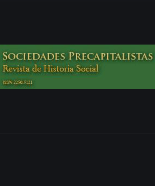
Sociedades Precapitalistas
Bridging Past and Present Through Scholarly InsightSociedades Precapitalistas, published by the Universidad Nacional de La Plata, Faculty of Humanities and Educational Sciences, is a distinguished academic journal that specializes in the study of pre-capitalist societies, exploring their structures, cultures, and dynamics. With an ISSN of 2250-5121 and an E-ISSN of 2250-5121, this Open Access journal has been committed to disseminating knowledge since 2011, ensuring that research is accessible to a global audience. Set in La Plata, Buenos Aires, Argentina, the journal serves as a vital platform for researchers, professionals, and students engaged in this niche yet significant field of study. Although specific impact metrics such as H-Index are currently unavailable, its dedication to academic rigor and the relevance of its subject matter highlight its importance for those exploring the socio-economic histories of societies prior to the capitalist era. As the discourse surrounding global history continues to evolve, Sociedades Precapitalistas plays a crucial role in enriching our understanding of past societies and their legacies.
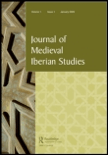
Journal of Medieval Iberian Studies
Bridging Disciplines in the Study of Medieval IberiaThe Journal of Medieval Iberian Studies is a leading academic journal published by Routledge Journals, Taylor & Francis Ltd, dedicated to exploring the diverse and rich tapestry of medieval Iberian history and culture. With its ISSN 1754-6559 and E-ISSN 1754-6567, this journal serves as a vital resource for scholars engaged in the fields of cultural studies and history, attaining a prestigious Q1 ranking in both categories as of 2023. The journal is recognized for its significant contribution to the humanities, featuring peer-reviewed articles that foster innovative research and critical discourse on medieval Iberia from 2010 to 2024. Spanning an array of topics, it encapsulates interdisciplinary approaches to medieval studies, making it an essential publication for researchers, professionals, and students alike who seek to deepen their understanding of this pivotal period in history. Although it currently does not offer open access options, the journal is committed to advancing scholarly discussion and knowledge dissemination within the academic community.